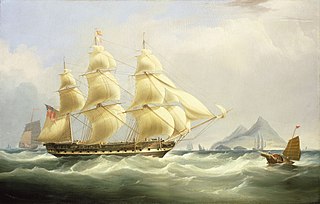Three vessels with the name Scarborough have served the British East India Company (EIC).

The East India Company (EIC), also known as the Honourable East India Company (HEIC) or the British East India Company and informally as John Company, Company Bahadur, or simply The Company, was an English and later British joint-stock company. It was formed to trade in the Indian Ocean region, initially with Mughal India and the East Indies, and later with Qing China. The company ended up seizing control over large parts of the Indian subcontinent, colonised parts of Southeast Asia, and colonised Hong Kong after a war with Qing China.
- Scarborough (1734 EIC ship) was launched December 1734 and made two voyages for the EIC. The Royal Navy purchased her on 21 November 1739 to use as a storeship, but then used her as a hospital ship instead. The Navy sold her on 18 December 1744.
- Scarborough (1740 EIC ship), launched c.1740, made four voyages for the EIC and gave her name to Scarborough Shoal after grounding there in 1748.
- Scarborough (1782 ship), launched in 1782, carried convicts on the First Fleet to New South Wales, carried a cargo for the EIC from China back to Britain, and again carried convicts on the Second Fleet. Scarborough then made one more trip for the EIC between 1801 and 1802.
Scarborough was an East Indiaman launched in December 1734 that performed two voyages for the British East India Company (EIC). The Admiralty purchased her in 1739 and commissioned her as HMS Scarborough. The original intent was to use her as a storeship, but instead she was fitted up as a hospital ship. The Admiralty sold her in 1744.

The Royal Navy (RN) is the United Kingdom's naval warfare force. Although warships were used by the English kings from the early medieval period, the first major maritime engagements were fought in the Hundred Years War against the Kingdom of France. The modern Royal Navy traces its origins to the early 16th century; the oldest of the UK's armed services, it is known as the Senior Service.
Scarborough was an East Indiaman launched in December 1740 that performed four trips to India and China for the British East India Company (EIC). She is most famous for giving her name to Scarborough Shoal, which she discovered by grounding there on 12 September 1748. She was sold for breaking up in 1753.
| This article includes a list of ships with the same or similar names. If an internal link for a specific ship led you here, you may wish to change the link to point directly to the intended ship article, if one exists. |



